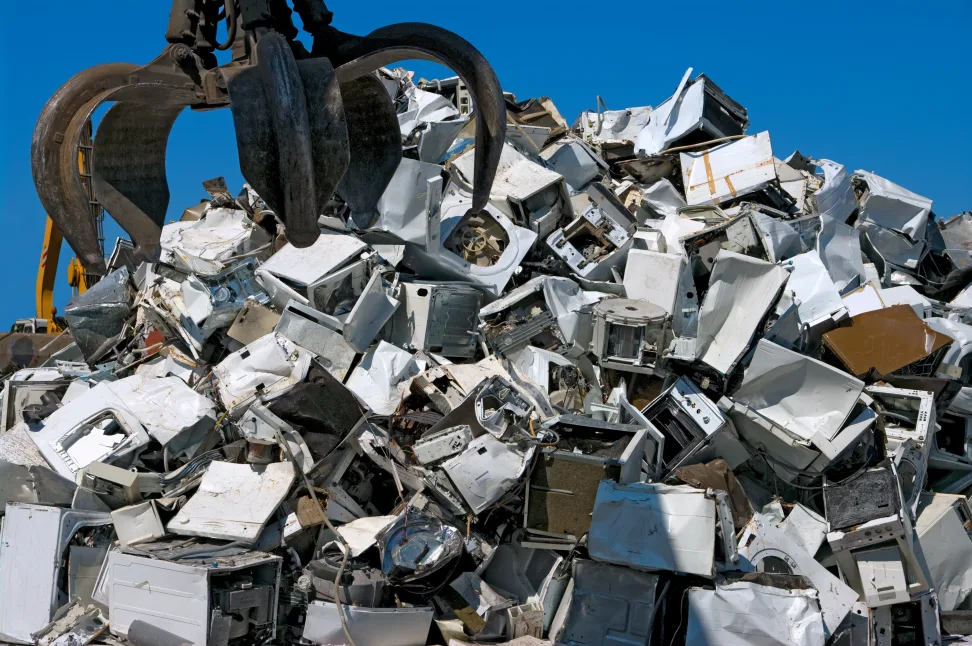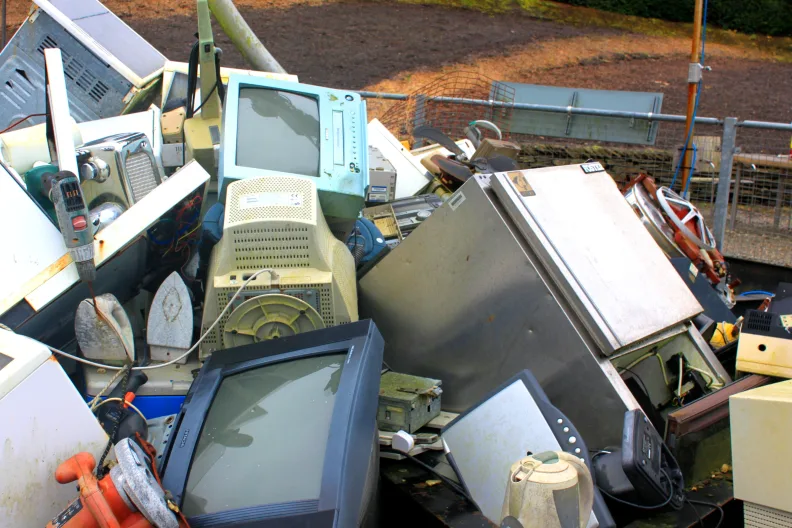Are you curious about how much scrap yards pay for old appliances? Do you have an old refrigerator or washing machine taking up space in your garage, and you’re wondering if it’s worth anything? Look no further – in this article, we’ll explore the pricing structure of scrap yards and the benefits of recycling with them.
First, let’s talk about what scrap yards do. They buy old metals and appliances and then resell them based on weight.
This means that even if your old appliance doesn’t work, it could still be worth something to a scrap yard. But how much do they pay for it, and what factors affect the price?
We’ll break it down for you in the following sections.

Overview
Looking to make some extra cash from your old stuff? Find out what you can earn at the scrap yard for your unwanted items.
It’s important to know the market value of your appliances before you take them to the scrap yard. Appliances that contain valuable metals like copper, iron, aluminum, and steel can earn you some money, while those with lots of plastic and non-metallic components may not be worth much.
The future trends for recycling at scrap yards look promising as more people become environmentally conscious and seek sustainable solutions for their waste. Recycling at scrap yards helps reduce waste in landfills and promotes sustainability.
By recycling your old appliances, you can help make the most out of obsolete, worn-out, and no longer working items while earning some extra cash.
Buying and Reselling
Scrap yards buy and resell old appliances, offering money regardless of their condition, as a way to promote recycling and reduce waste. The scrap yard profits from the sale of the appliances after they dismantle and separate the metal parts by weight. The market trends and metal values determine how much the scrap yard pays for each appliance.
Copper is the most valuable metal found in appliances like water heaters, refrigerators, and air conditioners, making them a popular item to recycle at scrap yards. The price paid for appliances at scrap yards varies based on several factors, including weight, size, and condition. Larger appliances like refrigerators, washing machines, dishwashers, freezers, dryers, and old stoves can earn more money than smaller appliances.
However, scrap yards do not purchase household appliances with lots of plastic and non-metallic components like toaster ovens, mixers, blenders, and electric irons. If you have an old appliance that you no longer need, consider selling it to a scrap yard to help reduce waste and earn a little extra money.
Pricing Factors
When it comes to pricing factors, it’s important to keep in mind that the weight, size, and condition of an appliance all play a role in determining how much it can earn in scrap value.
Factors affecting pricing can also include the demand for certain metals, such as copper, which is the most valuable metal found in appliances like water heaters, refrigerators, and air conditioners.
Negotiating with scrap yards can be a tricky process, as the price paid for appliances varies based on several factors. However, it’s important to do your research and shop around to find the best deal for your items.
When it comes to the value of different metals, copper is considered the most profitable, especially in appliances with motor coils, condensers, and capacitors. Cast iron is also a valuable metal found in stoves.
However, household appliances with lots of plastic and non-metallic components like toaster ovens, mixers, blenders, and electric irons are not worth much in scrap value.
In general, the weight and size of an appliance determine the price it can fetch at a scrap yard. Remember that scrap yards pay for appliances based on weight, size, and other factors, so it’s important to be aware of these factors when negotiating the price for your items.
Recycling Benefits
You’ll love the benefits of recycling your old appliances at a scrap yard, as it can help reduce waste in landfills and promote sustainability for a better future.
Recycling your appliances can have a significant impact on the environment by reducing the amount of waste that ends up in landfills. By recycling, you’re not only helping to conserve natural resources, but you’re also reducing greenhouse gas emissions that contribute to climate change.
In addition to the positive impact on the environment, recycling your appliances at a scrap yard can also promote sustainability. The scrap yard will take your old appliances, dismantle and separate them, and then use the recovered metals to create new products.
By doing so, they’re reducing the need for new materials to be extracted from the earth, which ultimately helps to conserve natural resources. So, not only are you doing your part for the environment, but you’re also contributing to a more sustainable future.
Scrap Yard Pricing
Recycling your old appliances can be a great way to earn some extra cash, as scrap yard pricing varies based on several factors, such as weight, size, and condition.
Factors affecting the price of an appliance include the type of metal it’s made of, the market trends for that metal, and the demand for it at the time of sale. For example, copper is considered the most valuable metal found in appliances like water heaters, refrigerators, and air conditioners. However, the price paid for appliances at scrap yards can also vary based on the current market demand for copper.
When considering recycling options for your old appliances, it’s important to compare the prices offered by scrap yards with other recycling options. Some cities may offer curbside pick-up for appliances, but they may not pay for the scrap value. Additionally, some companies offer to buy and recycle old appliances but may not pay as much as scrap yards.
Ultimately, it’s up to you to decide which option is best for you based on the price offered and the convenience of the service.

Recycling Revolution
If you’re looking for ways to make a positive impact on the environment, the Recycling Revolution is a non-profit organization that can provide actionable ideas and promotes sustainability.
The organization is dedicated to promoting green initiatives and eco-friendly solutions that can help protect the environment and reduce waste in landfills.
Recycling Revolution encourages people to think about ways they can reduce their environmental footprint and make a difference in their community.
The organization offers various resources and educational materials that can help people learn more about the benefits of recycling and sustainable living.
By spreading awareness and providing practical solutions, Recycling Revolution aims to create a more sustainable future for everyone.
Whether you’re looking to recycle old appliances, reduce your energy consumption, or adopt eco-friendly practices, Recycling Revolution can provide you with the tools and resources you need to make a difference.
Frequently Asked Questions
What are some tips for preparing appliances for scrap yards?
To prepare your appliances for scrap yards, start by cleaning them thoroughly. This will help to remove any dirt or grime that may affect their value.
Next, make sure to remove any hazardous materials, such as refrigerants or mercury switches, as these can’t be recycled and can harm the environment.
Finally, separate the parts of the appliance by material type, such as copper or steel, to make it easier for the scrap yard to process and offer you the best price.
By taking these steps, you can ensure that your appliances are ready for recycling and help to promote sustainability by reducing waste in landfills.
Can scrap yards recycle non-metallic components of appliances?
When it comes to recycling appliances at scrap yards, it’s important to understand what materials can and cannot be reused.
While scrap yards primarily deal with metals like copper, iron, aluminum, and steel, non-metallic components like plastic and rubber cannot be recycled.
This means that appliances like toaster ovens, mixers, blenders, and electric irons cannot be sold to scrap yards for recycling purposes.
Instead, these items should be disposed of properly through other channels to minimize their environmental impact.
It’s important to consider reuse options and proper disposal methods when dealing with appliances that cannot be recycled at a scrap yard.
What are some safety precautions to take when dismantling appliances for scrap yards?
When dismantling appliances for scrap yards, it’s important to take safety precautions to avoid health hazards.
First, gather the necessary tools needed, such as gloves, safety glasses, and a respirator mask.
Then, carefully dismantle the appliance, separating the metal parts from the non-metallic components.
Once the metal parts are separated, dispose of the non-metallic components properly according to local regulations.
It’s important to avoid cutting or breaking any components that may contain hazardous materials, such as refrigerant or mercury.
By taking these precautions, you can safely dismantle appliances for scrap yards and earn money while promoting sustainability.
How do scrap yards determine the value of antique or rare appliances?
When it comes to antique or rare appliances, scrap yards determine their value through a process called antique appraisal, rarity assessment, and market demand analysis.
These methods take into account factors such as the age, condition, and rarity of the appliance, as well as current market demand for similar items.
The scrap yard may consult with antique dealers or collectors to get a better idea of the item’s value.
Ultimately, the price paid for antique or rare appliances at a scrap yard will vary based on these factors, and may be significantly higher than the scrap value of more common appliances.
Are there any government regulations that scrap yards must follow when recycling appliances?
When it comes to recycling appliances, scrap yards must follow certain government regulations to ensure they’re disposing of them in an environmentally responsible manner. These regulations include properly handling hazardous materials and adhering to waste disposal laws.
Additionally, ethical considerations should also be taken into account, such as protecting workers’ safety and promoting sustainability.
By following these guidelines, scrap yards can help reduce the environmental impact of appliance waste and promote a more sustainable future.
Conclusion
So, you’re probably wondering if scrap yards pay for appliances. The answer is yes!
Scrap yards buy old metals and appliances based on weight and offer money for them regardless of their condition. The pricing structure of scrap yards is based on various factors, including the type of metal, weight, and current market value.
Recycling at scrap yards not only offers a financial incentive but it also helps the environment by reducing waste and conserving natural resources. By selling your old appliances to a scrap yard, you are contributing to the recycling revolution and making a difference in the world.
Not only are you getting rid of unwanted clutter, but you are also helping to reduce the amount of waste that ends up in landfills. So, if you have old appliances lying around, don’t hesitate to take them to your local scrap yard and get paid for them.
It’s a win-win situation for both you and the environment.